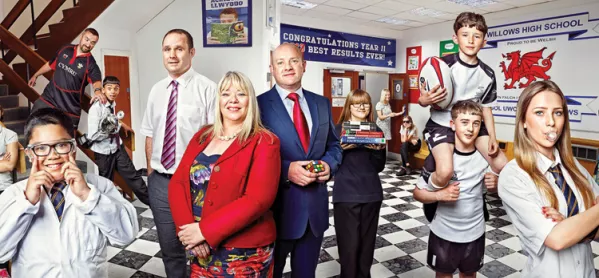As a previous member of the Educating… club (Sadly, this is a metaphorical club: we don’t all hang out), I tend to defend the series from criticism. The one thing I have agreed with is that it is sometimes difficult for the show not to repeat the same narrative arcs. Some of the stories in the series, although moving, are similar to those told previously. It was a charge used, sometimes fairly, against Educating the East End and I think it’s even harder to be original for series four. Personally, I blame Mr Burton and Thornhill for this. They really let the side down with the Musharaf episode of Educating Yorkshire. Show-offs.
So it was refreshing to see last night’s episode tell a familiar story for teachers, but a first for Educating…It was a tale of the escalation of petty gossip into violent behaviour. I do not believe a fight of that magnitude has been shown unfolding before. It has been alluded to previously, but has not been the central focus of an episode. For teachers, such events are a real concern. Some people watching may have dismissed this behaviour as “boys will be boys”, but the consequences of petty schoolboy fights can be serious. A short walk around your average 21st-century playground will reveal that teenage boys are getting bigger. At break time, they can tower over many of the teaching staff and are strong enough to do serious damage with their fists. Combined with the heady mix of testosterone and hormonal changes, it can be a dangerous cocktail.
Equally, a decision to exclude Dan could have been life-changing for the young student. Bad decisions made in your teenage years can honestly change where you go in the years to come. I felt that the way Ms Ballard gave him the responsibility to take control of his behaviour was correct; especially since she made very clear to him that a repeat performance could end in criminal charges. And this was heartening to see - much like on the sports fields, there is a strange perception that it is somehow OK to act violently to others in school while on the street it would be considered a criminal act.
Although impressed with Ms Ballard’s compassion, it seemed inevitable that it would happen again. Watching the scenes in the canteen as carnage broke out gave me a knot in my stomach. Gaining control of a situation like that in a confined space with a mixture of anxious and over-excited students is difficult. After that, all I could think about was the poor teachers, no doubt having been up late the night before, planning lessons for after lunch, only for an incident like that to blow all their hard work all out of the water. We’ve all been there, but outsiders fail to understand how your lesson is only as good as the lunchtime beforehand. Fights are a big distraction from word-level analysis in Shakespeare but even smaller external factors such as rain, wind or pupils having a negative conversation with teachers can be detrimental to the classroom atmosphere.
Then, the aftermath. You could see in Dan’s face that he’d realised he had buggered everything up. His machismo failed to mask the fact that he’s a young boy and the fear of the consequences of such thoughtless violence took a while to sink in. What was important, though, was that the school didn’t give up on him. Mr Cole made sure of that.
I have the greatest admiration for people who work in the departments set up to keep challenging pupils in schools. Mr Cole was brilliant: keeping calm and fighting for Daniel when he needed it most. When everyone seemed battered and ready to throw in the towel on this young life, he went to work. Behaviour units, inclusion units or whatever a particular school names them are not the glamour jobs in school. Their successes seem small, sometimes unclear, but harder fought for than most. Mr Cole’s intervention led to Daniel being allowed to stay in school, and getting four GCSEs. What was the alternative? Letting him drift out into the world lost and heading for disaster? Exclusion rarely leads to people learning the valuable life lessons you would hope it would. As Ms Ballard said, it should always be a last resort.
I am sure nobody is surprised that the boys ended up being best of friends again. How often is that the case? I suppose, in some ways, boys will always be boys.
